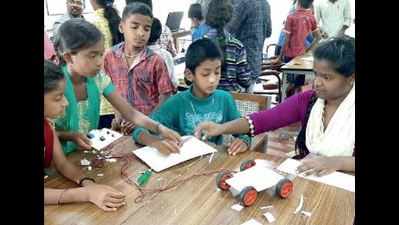- News
- City News
- bengaluru News
- Govt initiative mentors 100 gifted students from rural areas
Trending
This story is from November 21, 2019
Govt initiative mentors 100 gifted students from rural areas
Sarbhaz Khan, 11, is a live wire — he loves working with circuits and everything related to electrical equipment. He single-handedly set up wiring at the family home in H Matakere, a hamlet in Mysuru district, two years ago.

BENGALURU: Sarbhaz Khan, 11, is a live wire — he loves working with circuits and everything related to electrical equipment. He single-handedly set up wiring at the family home in H Matakere, a hamlet in Mysuru district, two years ago.
A government-supported initiative, National Institute of Advanced Studies (NIAS), being trialled in Mysuru and Chamrajnagar districts is now mentoring Sarbhaz, who studies in a public school, and 99 other talented kids from rural areas, helping them make the most of their potential.
NIAS, along with the state education department, identified the students, who are aged between 3 and 18, for the Gifted Education Programme (GEP) and conducts special workshops for them. The candidates’ progress will be monitored for five years.
“According to studies, gifted children are nominally distributed across populations. There are 33 million children in the age group of 6-18, and around 9.9 million, who form the top 3 percentage, are considered gifted. Of these, 7.2 million are in rural areas,” said Anitha Kurup, academic dean and head of the education programme. About 4.2 million gifted children, in rural and urban areas, are girls.
She added: “There are traits which distinguish them from the city kids: they are more cooperative than competitive and use resources more frugally. Currently, the GEP team is using its identification protocol to screen more students to determine the actual number of gifted children in the rural areas.”
There are plans to roll out GEP in other states. The groundwork for the pilot project in Karnataka began in 2016, when 1,000 teachers were trained how to spot children with remarkable skills. The teacher nomination behavioural rating scale, which has 26 questions, helped them identify special cognitive, socio-emotional, moral and ethical and physico-motive and kinaesthetic traits.
Some of the questions are: do they question conventions, have long attention spans and imagine hypothetical scenarios, and are they perfectionists.
Over the next two years, teachers nominated 850 out of 1 lakh students. The NIAS team shortlisted 175 students; officials visited 159 villages to interview these kids. Finally, 100 were selected for the programme.
The first three-day residential workshop for the candidates was held in 2018. The second, which lasted for five days, was organised in July this year. The third mentoring session is scheduled for January 2020.
A government-supported initiative, National Institute of Advanced Studies (NIAS), being trialled in Mysuru and Chamrajnagar districts is now mentoring Sarbhaz, who studies in a public school, and 99 other talented kids from rural areas, helping them make the most of their potential.
NIAS, along with the state education department, identified the students, who are aged between 3 and 18, for the Gifted Education Programme (GEP) and conducts special workshops for them. The candidates’ progress will be monitored for five years.
“According to studies, gifted children are nominally distributed across populations. There are 33 million children in the age group of 6-18, and around 9.9 million, who form the top 3 percentage, are considered gifted. Of these, 7.2 million are in rural areas,” said Anitha Kurup, academic dean and head of the education programme. About 4.2 million gifted children, in rural and urban areas, are girls.
“Unlike talented students in urban areas, students in rural regions don’t get the right exposure or have resources or opportunities to be mentored and guided by experts,” Kurup said, adding the new programme aims to help this group.
She added: “There are traits which distinguish them from the city kids: they are more cooperative than competitive and use resources more frugally. Currently, the GEP team is using its identification protocol to screen more students to determine the actual number of gifted children in the rural areas.”
There are plans to roll out GEP in other states. The groundwork for the pilot project in Karnataka began in 2016, when 1,000 teachers were trained how to spot children with remarkable skills. The teacher nomination behavioural rating scale, which has 26 questions, helped them identify special cognitive, socio-emotional, moral and ethical and physico-motive and kinaesthetic traits.
Some of the questions are: do they question conventions, have long attention spans and imagine hypothetical scenarios, and are they perfectionists.
Over the next two years, teachers nominated 850 out of 1 lakh students. The NIAS team shortlisted 175 students; officials visited 159 villages to interview these kids. Finally, 100 were selected for the programme.
The first three-day residential workshop for the candidates was held in 2018. The second, which lasted for five days, was organised in July this year. The third mentoring session is scheduled for January 2020.
End of Article
FOLLOW US ON SOCIAL MEDIA










